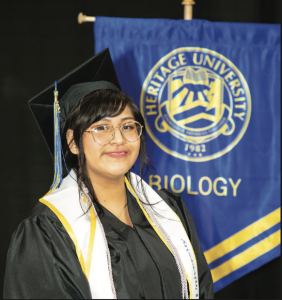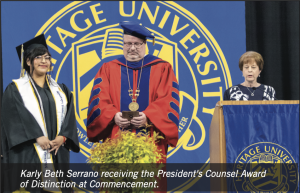Graduate’s Calculated Career in Medical Science
When Karly Beth Serrano was a small child, she would go with her mother to pick cherries. Her mom would climb the ladders and pick the fruit up high, and Serrano would pick the fruit from the bottom of the tree. She remembered the orchard owner coming around at lunchtime, passing out candy bars and cold bottles of water. That was the start of many years of working in the fields and warehouses to help support her family.

Karly Beth Serrano at the 40th annual Heritage University Commence held May 14, 2022 at the Yakima Valley SunDome in Yakima, Wash.
For a long time, it was just her and her mother. Ten years ago, her little sister was born. Around that same time, her mom developed a serious yet manageable illness that needed to be monitored by a primary care physician. However, her mother struggled to find reliable healthcare. She went five or six years without treatment before learning about the clinic at the Union Gospel Mission.
The Union Gospel Mission clinic provides medical services to patients who are uninsured and don’t have the means to pay. Many, like Serrano’s mom, don’t speak English. Children frequently take the role of interpreter, helping their parents and doctors communicate. Such was the case with Serrano and her mom. For two or three years, she would go with her mother to her appointments. Later, Serrano started volunteering her translation services for other Spanish-monolingual patients. At first, she went weekly, then as her schedule allowed her. Serrano got a great deal of personal satisfaction with the volunteer work and still provides translation services from time to time.
If there are two primary influencers that led Serrano to go to college and choose to major in biomedical science, they are her experiences working in agriculture and her time spent helping her mother with her medical condition. Serrano was still in high school when she decided she wanted to go to college and major in science.
“My mom always told me, ‘if you don’t want to work like a donkey, go to school!’” she said. “My family came from nothing. It’s my responsibility to provide for them and give back for all that they gave to me.”
Serrano knew she wanted a career that was far outside of the agriculture industry. The volunteer work she did with the Mission gave her the opportunity to “dip her toes in the medical field,” she said.
“Growing up first-generation, you only know about nurses and doctors. But there are so many other career options out there. I came to Heritage thinking I wanted to become a physician assistant,” she said. “But, once I got here, I decided to explore other options.”
Serrano was accepted into the McNair Scholars program, which prepares first-generation, minority and low-income students for graduate and doctoral studies. Their aim is to increase the number of minorities in academia. Serrano participated in two summer research projects. One at John I. Haas where she experimented on hop plant growth, and a second at the University of Washington, where she worked on a study looking at treating type 1 diabetes through generated cell growth in the pancreas. She presented this research at numerous scientific conferences, including the Annual Biomedical Research Conference for Minority Students.
“Those experiences got me thinking about what path I wanted to take after I graduate, either going into direct patient care, which will have me going to medical school, or becoming a medical researcher,” she said.
Graduation day for Serrano was in May, and with it came a surprise. Each year, the university selects one graduate to receive the President’s Council Award of Distinction. The award is bestowed upon a graduate with both a stellar academic record and a history of service to the campus community. Serrano graduated magna cum laude. Along with her volunteer work at the mission, and her research experiences, she also served as a mentor for students in the CRESCENT program.
“I was amazed that I received the award. The last three years of my undergraduate degree were super busy. Working from one project to another, I never really sat down and reflected on my accomplishments. With the award in my hand, I had a moment of realization; Wow, I really have accomplished a lot.”
While Serrano knew all along that she wanted a career in medicine, where she will end up is still a plan in the works. She is all about trying jobs on for size. She entered the medical field while still in college when she became a phlebotomist. The experience taught her that her desired career field is the right fit with her, and gave her some great material for her resume. However, she isn’t sure if she wants to be on the research side of medicine or in patent care. She was considering returning to Heritage to get her Medical Laboratory Science certification so she could work in a hospital lab for a few years to see if that was a good fit. But then, an opportunity that was too good to pass up came her way.
In July, Serrano is heading to Nashville, Tennessee to attend Fisk University. She was accepted into the Fisk-Vanderbilt Master’s-to-PhD Bridge Program. She received full funding to earn a Master of Science in Chemistry at Fisk with the option to transition to a Ph.D. program at either Vanderbilt or another university.
Regardless of the career she ends up entering, Serrano is set on remaining in the Yakima Valley.
“The need is so great here,” she said. “This is my home, and I want to serve the people who live here.
